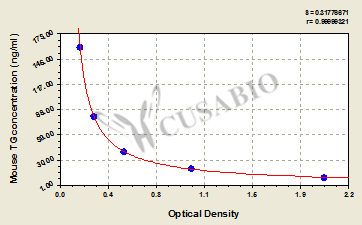Thyroglobulin (TG) is a large glycoprotein produced exclusively by thyroid follicular cells and serves as the precursor for thyroid hormone synthesis. This protein functions as a scaffold for the iodination and coupling reactions that generate triiodothyronine (T3) and thyroxine (T4) within thyroid follicles. Circulating thyroglobulin levels are commonly used as a biomarker in thyroid research and clinical diagnostics, particularly for monitoring thyroid function and detecting thyroid-related disorders. Changes in thyroglobulin expression and secretion are linked to various thyroid pathologies. This makes it a valuable target for studying thyroid physiology and disease mechanisms.
The Mouse Thyroglobulin ELISA Kit (CSB-E08241m) provides quantitative measurement of TG in Mus musculus samples. This competitive assay works with serum, plasma, and tissue homogenates. It has a detection range of 10 ng/mL to 160 ng/mL and a sensitivity of 10 ng/mL. The assay requires 50-100 μL sample volume and can be completed within 1-5 hours. Detection occurs at 450 nm wavelength, giving researchers a reliable tool for thyroglobulin quantification in mouse studies.
Application Examples
Note: The following application examples are drawn from a selection of publications citing this product. For additional applications, please refer to the full list of references in the "Citations" section.
This ELISA kit has been used in thyroid-related research to quantify thyroglobulin levels in mouse models. The applications span endocrine studies examining thyroid function and autoimmune conditions affecting thyroid tissue.
• Autoimmune thyroid research: Measuring thyroglobulin antibody markers in serum samples from mouse models of thyroid autoimmunity
• Thyroid tissue analysis: Measuring intrathyroidal thyroglobulin concentrations alongside other thyroid hormones in tissue samples
• Endocrine profiling: Quantifying thyroglobulin as part of comprehensive thyroid function evaluation in experimental studies






